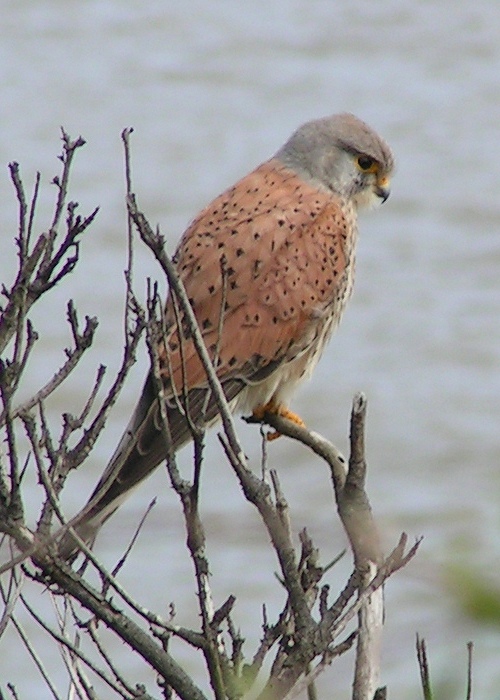|
| Query: banded kestrel | Result: 5th of 10 | |
Kestrel (Family: Falconidae, Genus: Falco) - Wiki
| Subject: | Kestrel (Family: Falconidae, Genus: Falco) - Wiki
| |

| Resolution: 500x700
File Size: 149501 Bytes
Upload Date: 2007:12:05 14:47:19
|
Kestrel
From Wikipedia, the free encyclopedia
Scientific classification
Kingdom: Animalia
Phylum: Chordata
Class: Aves
Order: Falconiformes
Family: Falconidae
Genus: Falco (partim)
[Photo] Common Kestrel, Falco tinnunculus, adult male. Photo by sannse (http://en.wikipedia.org/wiki/User:Sannse), May 2004, England. | Permission is granted to copy, distribute and/or modify this document under the terms of the GNU Free Documentation License, Version 1.2 or any later version published by the Free Software Foundation; with no Invariant Sections, no Front-Cover Texts, and no Back-Cover Texts. A copy of the license is included in the section entitled "GNU Free Documentation License". |
The name kestrel is given to several different members of the falcon genus, Falco. Kestrels are most easily distinguished by their typical hunting behaviour which is to hover at a height of around 10???20 m over open country and swoop down on prey, usually small mammals, lizards or large insects. Other falcons are more adapted to active hunting on the wing. In addition, kestrels are notable for usually having much brown in their plumage.
Kestrels require a slight headwind in order to hover, hence a local name of windhover for Common Kestrel.
Plumage often - but unusually for falcons - differs between male and female, and (as is usual with monogamous raptors) the female is slightly larger than the male. This allows a pair to fill different feeding niches over their home range. Kestrels are bold and have adapted well to human encroachment, nesting in buildings and hunting by major roads.
Kestrels do not build their own nests, but use nests built by other species.
Most species termed kestrels appear to form a distinct clade among the falcons, as suggested by comparison of mtDNA cytochrome b sequence data (Groombridge et al. 2002) and morphology. This seems to have diverged from other Falco around the Miocene-Pliocene boundary (Messinian to Zanclean, or about 7-3.5 mya). The most basal "true" kestrels are three species from Africa and its surroundings which lack a malar stripe, and in one case have - like other falcons but unlike other true kestrels - large areas of gray in their wings.
Approximately during the Gelasian (Late Pliocene or Early Pleistocene, around 2.5-2 mya), the main lineage of true kestrels emerged; this contains the species characterized by a malar stripe. This too seems to have evolved in Africa and subsequently spread across the Old World until they reached Australia some time during the Middle Pleistocene, less than one million years ago. This group contains several taxa found on Indian Ocean islands.
More enigmatic is a group of 3 predominantly gray species from Africa and Madagascar. These are usually considered kestrels due to their general shape and habits, but are probably more quite distinct from the true kestrels as outlined above.
The American Kestrel is the only New World species termed "kestrel". Actually, the molecular data of Groombridge et al. (2002), as well as morphological peculiarities (like grey wings in males and a black ear-spot) and biogeography, strongly support the view that this species, among the Falco falcons, is not a kestrel at all in the phylogenetic sense but perhaps closer to the hobbies.
Malar-striped clade or Common Kestrel group
Madagascar Kestrel, Falco newtoni
Seychelles Kestrel, Falco araea
Mauritius Kestrel, Falco punctatus
R??union Kestrel, Falco duboisi - extinct (c.1700)
Spotted Kestrel, Falco moluccensis, found in Indonesia
Nankeen Kestrel or Australian Kestrel, Falco cenchroides, found in Australia and New Guinea
Common Kestrel, Falco tinnunculus, found in Europe, Asia, and Africa
- Rock Kestrel, Falco tinnunculus rupicolus, found in South Africa
Basal lineage(s) of true kestrels
Greater Kestrel, Falco rupicoloides, found in Eastern to South Africa
Fox Kestrel, Falco alopex, found in Equatorial Africa
Lesser Kestrel, Falco naumanni, found in southern Europe, India, and Mediterranean Africa
African gray kestrels (a more distant group)
Grey Kestrel, Falco ardosiaceus, found in Central to Southern Africa
Dickinson's Kestrel, Falco dickinsoni, found in Eastern to Southern Africa
Banded Kestrel, Falco zoniventris, found on Madagascar
American Kestrel
American Kestrel, Falco sparverius, found in North America and South America
http://en.wikipedia.org/wiki/Kestrel
| The text in this page is based on the copyrighted Wikipedia article shown in above URL. It is used under the GNU Free Documentation License. You may redistribute it, verbatim or modified, providing that you comply with the terms of the GFDL. |
|
^o^
Animal Pictures Archive for smart phones
^o^
|
|